
Co-founders of Muo Boutique Hotel: Max Chia, Chia Su Keat and They Chei Boon (Photo: Sam Fong/The Edge Malaysia)
Down the main road that traces the flow of the Muar River, where Jalan Petri gives way to Jalan Maharani, are rows of century-old shoplots with a hodgepodge of signs bearing various stages of wear and tear. One signboard, however, stands out new and bright, like a beacon.
In fact, that might have been exactly what Muo Boutique Hotel appeared as to the Muar visitor, a beacon of hope in a fairly unimaginative hospitality landscape.
“As recently as five years ago, accommodation choices here comprised mostly converted shoplots for budget stays, with the rare hotel brand,” says Chia Su Keat. “There was a definite lack of unique hotels.”
Before the royal town of Johor developed its tourism industry, its expertise in furniture and microelectronics manufacturing attracted business travellers. Rather than settle for the scant options available in town, they mostly preferred putting up in Melaka and driving up and down as necessary. Chia, who had worked in Kuala Lumpur’s banking industry before returning to Muar to open a restaurant, was discussing the state of affairs with two friends over a meal when they decided the time was ripe for a new player to shake things up in the local hospitality scene.
muo_hotel.jpg

The two were They Chei Boon, who had several irons in the fire that is the business world, and Max Chia, the son of travel agency owners who had been leading tours overseas from the time he was in his mid-teens. No strangers to the notions of uncertainty and ambition, the trio calculated the risks and believed the potential rewards were worth leaping headfirst into. Most of their combined life savings went into buying a three-storey corner lot they found just two weeks into their search for the perfect location. The 10,000 sq ft riverside property had fallen into disrepair after being left vacant for years, and the aspiring hoteliers stripped the interior bare to erect a contemporary, light-filled space outfitted in retro décor with nods to the town’s heritage and creative community. Named Muo, after the local pronunciation for Muar, it opened its doors to the public in 2017.
“We retained the façade but completely overhauled everything else,” says They. “We had a vision but didn’t know how to articulate it, so we learnt along the way, picking up knowledge on construction and décor. The individual basins in each room, for instance, were sourced and sprayed by us. Max was especially hands-on in the interior design.”
The reception area is laid out as an eclectic escape. Full-height windows and massive potted plants infuse brightness and warmth, while an assortment of retro paraphernalia — old TV sets and radios, antique lamps, even a beautiful sewing machine — create a nostalgic throwback for guests above a certain age. Small touches substantiate the theme, such as old-school candies for a taste of yesteryear, arranged on woven baskets or wooden chairs and tables. Anchoring the aesthetic in this century, however, are low-slung sofas, a corner display of funky T-shirts and an abundance of art in the form of illustrations depicting Muar’s art, culture, street food and everyday scenes, splashed out on canvases, poster rolls and postcards.
“I like collecting vintage items and some of my personal collection has been included in the décor,” says Max. “It makes me happy to meet customers who share similar interests in these things or are curious about these long-gone eras. Some of our guests or locals have even brought their own collection of antiques to be displayed here rather than let them gather dust or go unappreciated at home. It gives this place a sense of mutuality, a two-way relationship between us and our customers, which is what we want. This should be a place where anyone who walks in feels like they belong.”
Reservations are made mostly by business travellers from around the country on weekdays while weekends see a steady stream of domestic tourists and Singaporeans, at least in the pre-novel coronavirus days. The demographic also comprises largely families and younger travellers, sold by its Instagrammable appeal and modern conveniences such as ample charging points.
img_20200805_112220.jpg

“Before the hotel was completed, locals would come around for a peek and were surprised at the minimalist canvas of the lobby,” says They. “It’s not a very common look in Muar, so people would look at the cement floors and the blank walls and ask, that’s all? But once it was up and running, I think they could feel the cosiness.
“People often ask us what’s the different between a boutique hotel and a budget hotel. Boutique hotels may be of similar size — Muo has 24 rooms — but a lot of thought and attention is poured into the concept, materials and service, which is reflected in their prices. Our mattresses, linens and duvets are of five-star standards. Budget hotels don’t invest much in these things because they have to keep costs low to keep selling prices low. We also make it a point to go the extra mile — our slogan is “More than a stay” because we focus on that personal touch, on creating a warm reception for guests not just to our hotel, but in Muar. Our check-in counter has seats, for instance, because we don’t want guests to be forced to stand while sorting out their reservations. Our staff will invite you to sit down and make conversation.”
The founding trio seem to have struck a formula for success with their triptych of design, comfort and customer service, if the positive feedback they have been receiving is anything to go by. That their fellow townspeople approve of and support the business is the biggest compliment they have been paid.
“It’s gratifying to hear locals talking about our hotels,” says They. “The budget hotels and big chains don’t come up much in conversation, but Muo does.”
Chia adds: “Muo also has among the best ratings for hotels in this area, which is something we’re definitely proud of as a new player in this industry.
“It’s affirmation that we are doing well. The brand name has also since grown in Muar with our opening of Muo Resort, Muo Villa and the Muo Suites homestay, and we are soon opening our first hotel outside Muar.”
The Muo hospitality product is being exported to other parts of the country, starting with an upcoming chapter in Seremban.
“In terms of business scale, Muo Boutique Hotel is quite small since we’re limited to just 20-plus rooms,” says They. “We felt like we had to expand for this to make financial sense, to increase our sales and spread out costs. Each branch will have its own unique concept based on its location. Muo Boutique Hotel is very much town-centric while Muo Resort is more rustic and geared towards the outdoors with its garden areas. Even when we expand outstation, we will retain the Muo name and spirit. Muar people are very proud of their roots; we seldom refer to ourselves as Johoreans. It’s always orang Muo. So we will carry this with us. I hope that we can spread the word about what Muar has to offer through our brand.”
muo_resort.jpg

Seremban seems like an odd choice to set up their first outstation outpost, but the trio are intentionally eschewing the traditional tourist cities such as Kuala Lumpur, Penang and Melaka in favour of second- or third-tier cities.
“We see a window of opportunity in these destinations to tap into a fairly underdeveloped hospitality scene before they grow busier,” says Max. “Competition is too high in the major cities, but we are familiar with what smaller areas might want or need in terms of hospitality. Some of the rules are standard, there are operating and behaviour guidelines that shape expectations, but we know and are continuously learning how to create an experience.”
“With campaigns such as Cuti-Cuti Malaysia, combined with the impact of Covid-19, Malaysians are travelling domestically more than ever now,” chimes in They. “They are venturing out to smaller towns or places off the beaten track, so we think there is great room for growth in these places.”
Max continues: “When we first pitched the idea of a boutique hotel in Muar, people asked whether there was a market for such a thing here. There were many similar questions that suggested there wasn’t a lot of confidence that Muar had what it took to gather a big-enough crowd of tourists.
“But I think projects like Muo were among the major catalysts to amplifying tourism growth here. Locals saw the potential the town had for tourism while visitors from out of state were willing to spend more time here.”
muo_rooftop.jpg

The leap of faith the young founders took to pour their savings into their own community spoke volumes of their belief in and commitment to Muar’s development.
“It’s a capital-heavy business, especially in the early days when we needed to secure the property for the first Muo hotel, refurbish it entirely and get it up and running,” says Chia. “This was entirely self-funded too. I think people could see how much we have invested in this and how dedicated we are to making this work. For instance, we have also opened complementary businesses such as a laundry service, where all our linens are cleaned. Long-term endeavours like this give corresponding industries such as cafés and tourism activities the confidence to do the same. There’s almost a ripple effect from these types of investments.”
Hotel staff are only too eager to point guests in the direction of the town’s distractions and pursuits, from walks by the river out to the jetty to acquiring the quintessential haul of goodies from Mee Siput and kaya to durians. Century-old buildings with unique architecture and traditional businesses that still operate out of old shophouses make strolling through the town a pleasant must-do, good weather willing.
“Muar is a beautiful place and we love being able to share it with the world,” says Chia. “Even knowing what we do now about breaking into the hotel industry — the challenges and struggles — I’d do it all over again. Muo is more than just a hotel, though, as its tagline says. We are planning to build it into a comprehensive lifestyle brand. We have thematic merchandise, such as the T-shirts and postcards, which we have commissioned from local artists, and are working with a factory hopefully to allow guests to print their favourite photos from their trip or customise their names onto T-shirts, to be delivered overnight. This is something that I think will resonate with guests.”
Max adds: “Customers have also remarked on how much they like our pillows, so these are now also for sale. We are constantly looking at ways to add value through gestures or ideas such as this. We want you to be able to take back the things you love about the town or your time here. You should be able to take a bit of Muar home with you.”
This article first appeared on Aug 24, 2020 in The Edge Malaysia.


